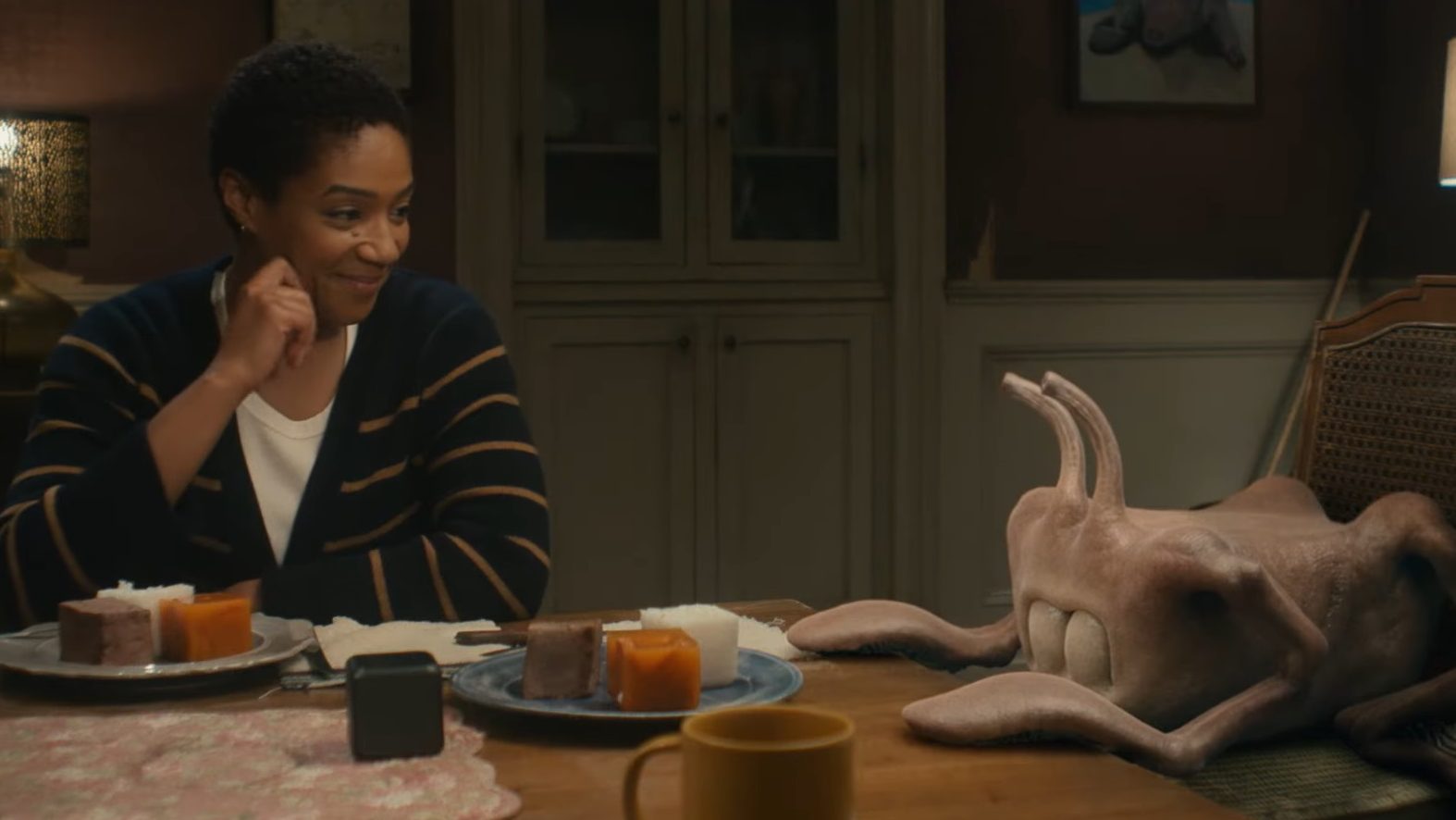
He may only have two features under his belt – with a third arriving imminently when literary adaptation Landscape with Invisible Hand comes to theaters this Friday – but Cory Finley has already carved out a reputation as one of the most interesting young filmmakers in the business.
Breaking through with his debut on acclaimed black comedy thriller and cult classic in the making Thoroughbreds, he followed it up with HBO’s Bad Education, a scathing look at the true story behind the largest embezzlement in the history of America’s public schools that won a Primetime Emmy for Outstanding Television Movie, as well as a Best Actor nomination for star Hugh Jackman.
Finley is back with what’s easily his most ambitious effort yet, seeing as Landscape with Invisible Hand takes place in the aftermath of an alien invasion that’s seen a species known as the Vuuv assume command of the planet by way of an economic takeover, with the story largely following Asante Blackk’s Adam Campbell and Kylie Rogers’s Chloe Marsh.
The star-crossed lovers find they can earn money by broadcasting their budding romance to the Vuuv, who seem fascinated by earthly customs such as romance, as well as the Golden Age of small screen sitcoms. However, when the pair break up but still continue on with their televised exploits, they end up being sued by their intergalactic overlords.
That barely covers the multitude of plates Landscape with Invisible Hand is spinning at any given time, but fortunately We Got This Covered had the chance to speak to writer and director Finley prior to its release. In our exclusive chat, he covers the delicate balance between genre elements, working with CGI, putting a different spin on a familiar setup and much more, which you can check out below.
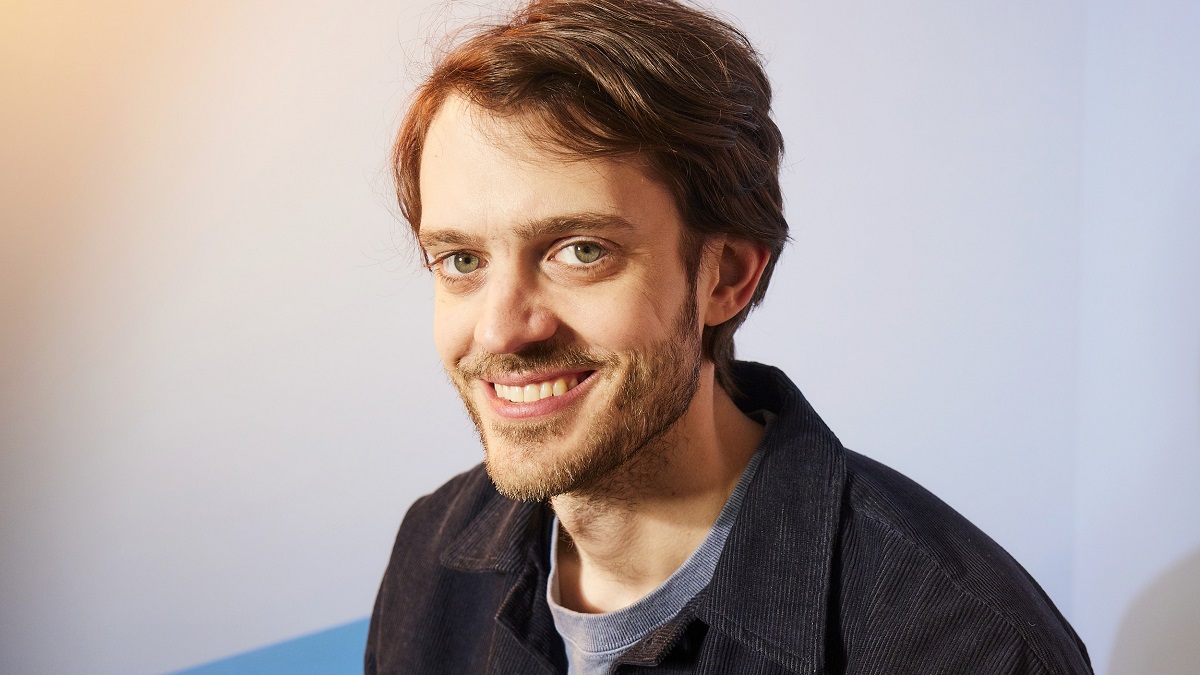
Have you been getting impatient, agitated, or antsy at all waiting for the movie to release, seeing as it’s been a while since the Sundance premiere?
Cory Finley: I’ve gotten used to delays. So I’ve made three movies now, and each one of them has premiered at a festival, and then premiered several months later in the world. So that’s just become a part of my normal routine… I’m sorry, my, my crazy little dog is going crazy. I’m just gonna lift her up for one second. She’s an inspiration, in a way, for the aliens. So she can just be a part of this interview. But she’ll stay right down here.
But yeah, so I’m very excited to have the movie out in the world, it’s been a long time since we shot it, an even longer time since I first conceived of it. And we had some COVID delays, and all those sorts of good things. But the good side is that did offer me a chance to really work closely with my visual effects supervisor, Erik De Boer, in kind of crafting and simplifying and iterating on these aliens that are sort of the visual core of of the movie. So the delays have been a blessing in a way.
Even though it’s a major departure from everything you’ve done previously, it still carries on a theme of your career of taking on a different genre with each project, which I’m assuming is an intentional and deliberate thing. So was sci-fi always on the list to get ticked off sooner rather than later?
Cory Finley: Yeah, I do. I’m very restless. And I get easily bored by a genre that I’ve just spent two or three years living in. And yes, I wouldn’t say I’ve been like a rabid sci-fi fan since I was a kid. Although I love, I used to love fantasy, and that’s – I suppose – an adjacent genre. But I was really just about finding this book, M.T. Anderson’s book of the same name, Landscape with Invisible Hand.
It was such a sort of crazy and unique world and such an absurd sense of humor, that it felt really, really difficult to adapt in a good way, and very different from what I’ve done before while still maintaining sort of thematic preoccupations of mine. So yeah, it was it was the book that brought me to the genre, more than a desire to hit the genre on its own terms.
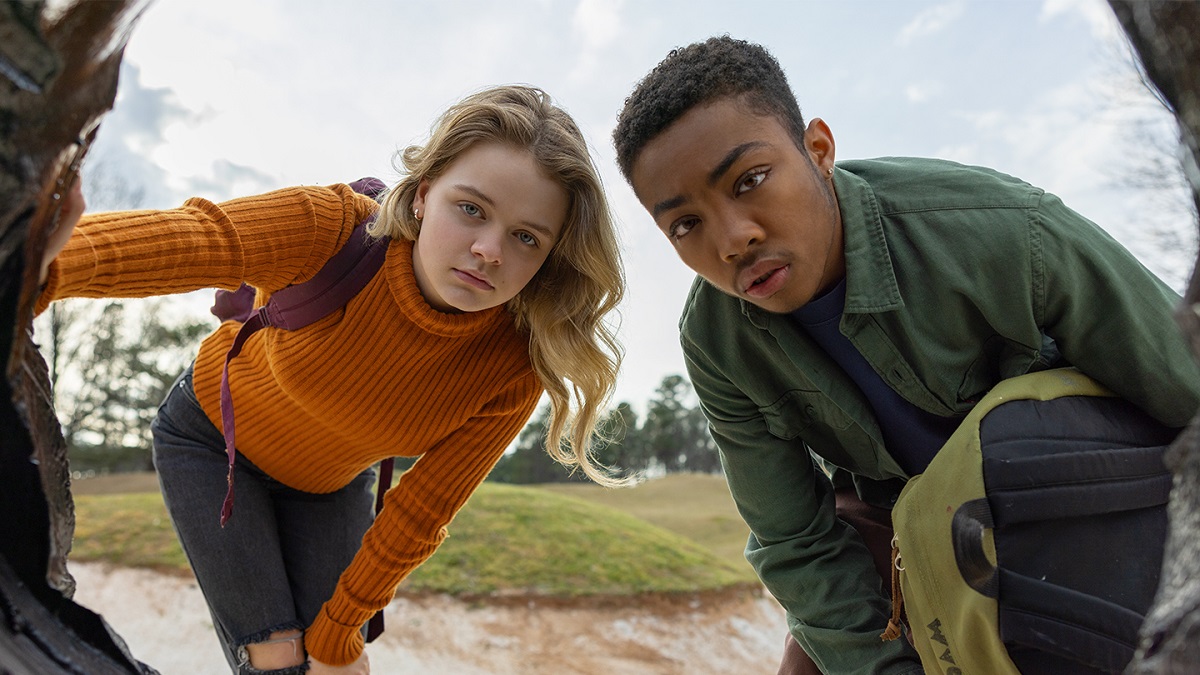
Alien invasion movies have been done to death, alien occupation movies have been done to death, but aliens coming in and taking over the entire global economy has not, so was that your way into the story from the beginning, or was it a number of different things that first captured your attention and started your imagination running wild?
Cory Finley: That was one of the primary things that got my imagination going. I love that central conceit of the book, this idea of a sort of free market alien invasion, a purely economic alien invasion. I thought that was an interesting spin on the genre, and very truthful to the way that at least I experienced sort of power and political power expressed through economic factors every day.
And I was also very drawn to the central character, to this character of Adam, kind of a young artist just beginning to find his voice, figuring out how to deal with love and all those complications, being kind of a nerd, kind of sweet, but also very concerned with authenticity. That spoke to me at that age, certainly. But yeah, it was the premise, it was the skewed take on an alien invasion story that really brought me to the to the material.
I mean this in the nicest way, but it’s an incredibly weird movie. There’s a lot of offbeat stuff going on from scene to scene, but did you ever find yourself having to pull back on the more absurd elements at all, because from watching the film it would have been easy to simply make the most bizarre and outlandish thing imaginable?
Cory Finley: Yes, it’s a good question. And it was something I thought about a lot. I feel like a director’s job is always to rein in the tone. And I knew the reason to pick this project is it has a very over the top, bizarre set of elements in these aliens, and in this sort of collision of the extremely alien with the extremely everyday.
So yes, in executing the movie I wanted to be to ground it in as many ways as possible, whether that was ways of shooting scenes that just make them feel more human in scale, deliberately stripping away some of the kind of shock and awe that you usually get with science fiction, and letting the comedy of some of these bizarre scenes of human/alien interaction really play in kind of a deadpan way rather than going for, you know, sight gags and goofy editing, or anything like that. We tried to be within the really strange construct of the movie, we tried to be as kind of old school and stripped down as possible, in the way we made the movie.
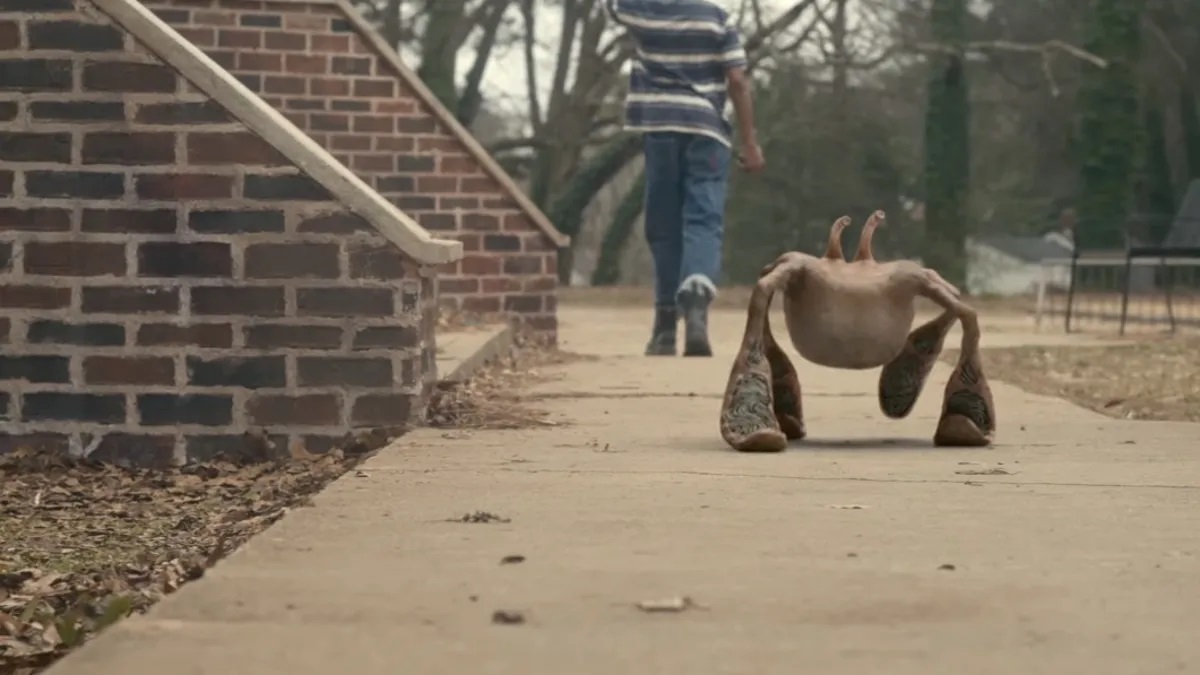
There’s a lot of different genre elements threaded throughout, whether that’s sci-fi, comedy, romance, drama, and all the rest, were you always conscious on-set or in post – or both – to ensure none of them overpowered the other, because the final cut is very much its own thing and hard to pin down as a single genre.
Cory Finley: Yeah, I always try to keep that that kind of delicate balance of genres. And I don’t know if marketing departments ever appreciate it, because we live in a world where we’re very quick to reach for familiar whether, it’s rom-coms, action movies, you know, all genres that I have great respect for. But the stuff I’ve always loved is the uncategorizable stuff.
And yes, if you’re making a movie that very consciously blends sort of a teen romance and social satire and hard science fiction elements, you definitely have to be very cognizant of both keeping any one genre from dominating and letting it fall into one category, but also from making sure that those different genre conventions kind of reinforce one another, or allow you to surprise the audience in fun ways, and not just sort of piling random different genre conventions to fight one another, one on top of the other, if that makes sense.
It’s your first time working with this level of CGI, practical, and visual effects. Was that a steep learning curve that threw up any challenges or difficulties, or was the opposite true and it turned out to be easier – or at least less stressful – than you imagined?
Cory Finley: Well, in a way it was definitely a steep learning curve. And the biggest thing was just how time consuming it is, and how… The biggest eye-opening part of it for me, it was just how careful and particular these artists have to be, and how obviously technically complex it is to create some of these images, and how many levels of iteration you have to go through, but also how difficult it is to make changes late in the process without just scrapping the whole thing and starting over.
And in the past as as a filmmaker, I’ve had the luxury of being a little bit sort of impulsive, and getting all the elements together in a room; the actors, the set, costumes, and sort of going off instinct, going off feel, and just sort of shaping them, bringing all the elements together in in real-time. And with CGI, you have to be much more pre-planned about it, you have to try to sort of see down the line what you want the final product to look like, and communicate that as clearly and as consistently to the artists making the work as possible.
But the sense in which it was easier than I thought was just in that I had this amazing collaborator and sometimes mentor in Erik De Boer, our VFX supervisor, who really helped me conceive of the creatures. He’d worked with Bong Joon-ho on Okja, that movie with another sort of incredible CG creature. And he made the process a lot more enjoyable, and a lot cleaner than than it would have been if I were just going in alone.
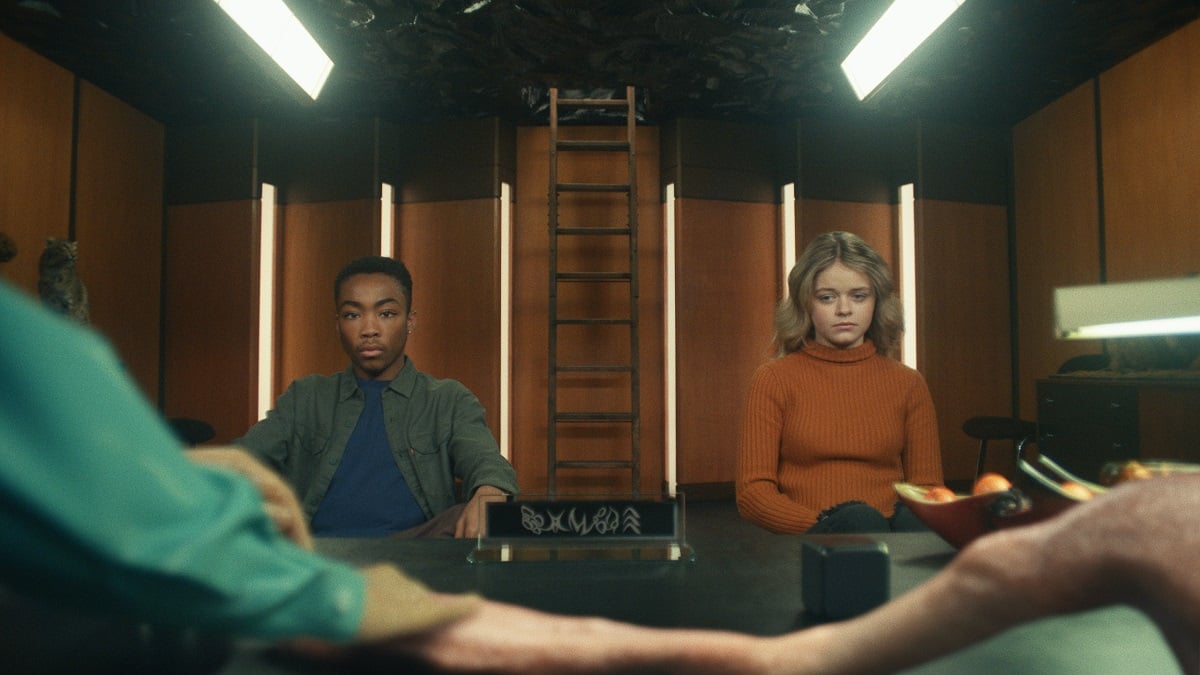
If you could make any project of your choosing without restrictions that can cost as much as you want and turn out however you want, what would it be and why would it be that?
Cory Finley: Oh, that’s such a good question. And I’ll, I’ll kind of cop out… it’s not a cop out. I think so. So I have, you know, a couple other projects in the hopper that I don’t want to talk about before they’ve kind of fully taken shape, but I would say – in the Vegas way – I definitely want to make movies on a large scale. Like, I’m always very inspired by something like Mad Max: Fury Road.
I’m excited to see Furiosa coming out soon, but what George Miller was able to do, they’re really kind of like creating a new franchise. Sure, it’s a sequel, in a sense, but it’s a sequel to his own his own work from long ago. And to be able to make something that has that kind of scale that really works on kind of a popcorn movie level, but also breaks new ground as far as just the storytelling, the world-building and just works in a very sort of auteurial way. That would be my dream. But in the meantime, there are lots of stories that I want to tell of all sizes, and I’m just as excited – certainly as a viewer – by smaller movies that really speak to people, as I am by the big popcorn ones.
Landscape with Invisible Hand comes to select theaters this Friday, Aug. 18.
from Movie News | Movie Reviews | Movie Trailers https://ift.tt/uxaEyf8
No comments:
Post a Comment
Please let me know